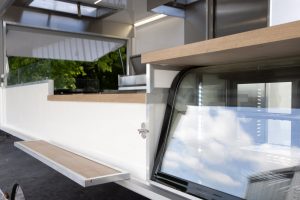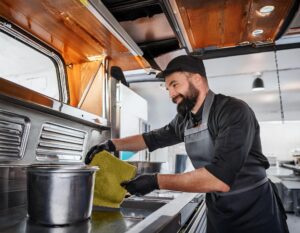When you launch a mobile French fry shop, you already need a lot of insurance: professional liability, vehicle insurance, stock insurance, equipment insurance… Wanting to insure everything from the outset can make the bill skyrocket and put a strain on your cash flow. So it’s best to concentrate on the cover that’s really essential. For example, “loss of foodstuffs in cold storage” is useful, but can wait a while. Legal protection” is also useful, where professional liability coverage can’t wait. Let’s take a look at everything you need to know.
Reading guide
Why insure your mobile French fry shop?
Basically, it’s a legal obligation. As you probably know, every entrepreneur is legally obliged to take out professional indemnity insurance(PII). This covers damage caused to third parties (customers, passers-by, etc.) in the course of your business. For an itinerant French fry shop, the risks can be related to burns, food poisoning and so on.
But there are other types of insurance that are essential to your business, meeting other challenges:
- Professional vehicle insurance: your converted truck must be insured specifically for professional use. This insurance will cover damage caused or sustained by the vehicle, as well as third-party liability. Expect to pay between €1,000 and €2,000 a year.
- Professional multi-risk insurance: this protects your business assets (equipment, inventory, etc.) against events such as fire, theft, water damage or electrical damage. It costs around €1,000 a year.
- Business interruption insurance: in the event of a claim resulting in business interruption, this insurance will compensate you for your financial losses. It is often offered as an option to comprehensive insurance. Expect to pay around 2% of your annual sales for this coverage.
- Specific food insurance: although optional, product contamination insurance can be useful in the event of a health problem involving your products. Loss of foodstuffs in cold storage” extensions are also available. Expect to pay a few hundred euros per year.
How do you choose the best insurance for your mobile French fry shop?
Overall, for an itinerant French fry shop just starting out, a budget of between €3,000 and €5,000 a year is the minimum needed to be properly insured. Then there’s the question of choice. Here’s how.
Step 1: Identify your precise needs
- List all your equipment (French fry shop, refrigerators, vehicle, etc.) with their new purchase and replacement values. For example, a professional French fry shop at €5000, a converted food truck at €40,000, etc.
- Estimate the average value of your stock (ingredients, packaging…). For example, €2,000 worth of goods.
- Estimate your projected monthly and annual sales, based on the sales in your business plan. Let’s say €10000/month, or €120,000/year.
- Make a precise list of your locations and modes of activity (markets, events, tours…). For example: weekly markets at X, Y, Z and festivals A, B, C throughout the year.
→ These detailed figures will help you determine the level of cover required for each item. This will enable you to request suitable quotes and compare what’s comparable.
Step 2: Consult and compare several insurers
- Contact at least 3 insurance companies or brokers, if possible specialized in mobile catering, so that they fully understand the challenges facing a retailer. Among the recognized players in this niche: MAAF, AXA, Allianz, AGIR, Verspieren…
- Send them the information gathered in step 1 to obtain detailed, customized quotes.
- Carefully compare the offers you receive, looking beyond price. Look at each coverage (liability, legal protection, food truck, stock, business interruption, etc.):
- events and claims covered (fire, accident, theft, breakdown, poisoning, etc.)
- compensation ceilings (€50,000, €100,000, unlimited…)
- Deductibles (€500, €1000…)
- main exclusions and restrictions
→ Don’t hesitate to ask insurers questions to get a clear, unambiguous comparison. Beware of inexpensive contracts … but with many exclusions! Choose top-tier players.
Step 3: Fine-tune and optimize contracts
- Challenge selected insurers. Suggest adjustments, negotiate certain clauses (deductibles, ceilings, etc.).
- Find out if grouping all your contracts (professional liability, vehicle, comprehensive, etc.) with the same insurer entitles you to attractive discounts.
→ Remember to include a periodic review clause, so you can adjust cover to changes in your business without turning everything upside down.
Steps to take out the right insurance for your business
Once you’ve made your choice, here’s how to go about subscribing:
- Put together a complete file with all the supporting documents requested by the insurer: company or self-employed entrepreneur’s articles of association (Kbis or K, SIRET…), detailed business description (see previous steps), managers’ CVs, projected balance sheets, any claims history…
- Return to the insurer the contractual documents (quotation, proposal, special conditions, etc.) duly completed, initialled and signed.
- Pay the first premium by the agreed method (cheque, bank transfer, credit card, etc.) so that the contract takes effect on the agreed date.
- Find out what to do in the event of a claim. Adopt the right reflexes from the outset: rapid declaration, evidence, precautionary measures…
One last word…
Listening, careful comparison and negotiation are the keys to finding the best insurance for your mobile French fry shop. Rigorously compare the cover offered, the deductibles, the indemnity ceilings. Watch out for gaps in coverage!
For example: Insurer A offers RCP at 800€/year with a 500€ deductible, Insurer B offers RCP at 1200€/year with a 200€ deductible. At first glance, offer A is more attractive, but in the event of a claim, offer B will cost you less.
Once properly insured, insurance does not exempt you from rigorous day-to-day risk management! It’s an essential safety net, but not a blank check for neglecting safety, hygiene or maintenance. At Ecomag, this is our core business: for many years now, we’ve been supporting our customers in their projects, at every stage (design, manufacture, fitting out, training, delivery).
Need more information?
Questions about your new truck?
Our team is there for you! We’ll answer all your questions and guide you every step of the way. Contact us today:
Our food trucks and store trucks
Our food trucks
Pizza truck - Snack truck - Chip truck - Creperie truck - Sushi truck - Thai truck - Catering truck - etc.
Our store trucks
Hairdresser truck - Grooming truck - Event truck - Mobile office - Advertising truck - Tattler truck - etc.


